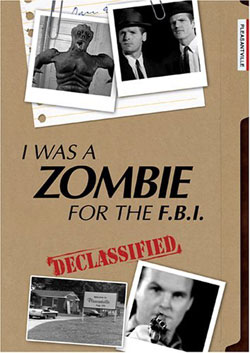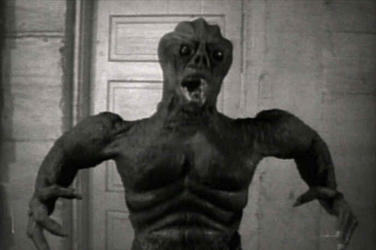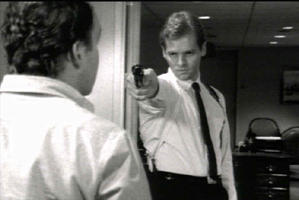 UFOs. Old fashioned zombies. Tough G-Men. Gangsters. The secret formula for the nation’s favorite soft drink. The Zomball. A stop motion monster.
UFOs. Old fashioned zombies. Tough G-Men. Gangsters. The secret formula for the nation’s favorite soft drink. The Zomball. A stop motion monster.
These are the elements that make I Was a Zombie for the FBI one of the strangest and quirkiest movies ever made. Shot in 1982, it looks and feels just like it came out of the 1950s.
A cult classic for decades, I Was a Zombie for the FBI is finally making it out on DVD, thanks to Rykodisc. I had a chance to talk to Marius Penczner today, and he shed some light on the origins of the film – as well as what the heck he has been doing since the movie came out.
I Was a Zombie for the FBI is out in stores today, and keep an eye open – we’ll be giving away five copies of this weird gem very soon!
Q: Your movie, I Was a Zombie for the FBI, is out this week on DVD. I was sent a copy to watch before doing this interview, and I have to say that if I hadn’t know it was made in 1982, I would have just assumed it was made in 1952.
Penczner: We did what we set out to do – we fooled you!
Q: When did you decide to make this a straight 50s b-film?
Penczner: When we originally came up with the idea for the movie it was going to be a slapstick comedy, along the lines of Blazing Saddles. When we did the auditions we noticed how hard it was for actors to pull off those comedic roles – they were much better doing it straight and schlocky, like 50s actors might do. So we decided to turn their weaknesses into strengths, something that they were actually good at, which was playing it straight. So what we ended up doing rather than Blazing Saddles was something like The Untouchables meets Plan 9.
Q: And you pulled it off. When did the idea to make the film happen in the first place – when did you decide to do a feature film?
Penczner: I had won an Emmy in 1981 for a short film that I did and got the prize money, which was four thousand dollars. To me that was an incredible amount of money. So we  took that and thought now we have a couple thousands bucks in our pockets, let’s make a feature. We leveraged that and added some of our own money, and the original budget was $12,000. What surprised us was how much snacks and sodas zombies go through on the production of a film. The budget for the movie ended up being 27 grand, including the film and processing. We wanted to do a feature, so we got our friends together and our money together.
took that and thought now we have a couple thousands bucks in our pockets, let’s make a feature. We leveraged that and added some of our own money, and the original budget was $12,000. What surprised us was how much snacks and sodas zombies go through on the production of a film. The budget for the movie ended up being 27 grand, including the film and processing. We wanted to do a feature, so we got our friends together and our money together.
Q: It ended up on the late, lamented Nightflight. That’s where a lot of people discovered it.
Penczner: It ended up on Nightflight as the second half of a double feature, usually with Attack of the Killer Tomatoes. That was their cult night.
Q: That’s not bad company.
Penczner: It worked out nicely and the people on Nightflight couldn’t have been better. It kind of became one of their cult favorites. Fortunately the guys from Rykodisc ended up picking it up because they remembered it from Nightflight. We thank them a lot, because for a campy little film like what we were doing then, a lot of people remained fans of the movie. Including Bob Dylan, who said it was a movie he wished he had been in in and interview with Interview magazine many, many years ago.
Q: I read that. That’s incredible – have you ever met Bob Dylan?
Penczner: We did. I was doing a show somewhere and he was involved with it. We met in a hotel lobby and he said, ‘I got to tell you something man, I really love your film.’ I said, ‘Thank you, and if you want one I can send you a copy.’ ‘I already bought one.’ He said, and I said, ‘You bought that one copy we sold!’
But he was an insomniac and he used to stay up late watching Nightflight and he saw us on the show.
Q: That’s great. If Bob Dylan were to buy the new DVD, what would he find on it?
Penczner: It’s a little shorter than the original version, which was 105 minutes long. We forget how quickly audiences process information. What seemed to be very appropriate at the time – and first time filmmakers tend to fall in love with their work, and everything tends to be a little long anyway. But this is much tighter than it was, and it works much better.
Q: Did you take this opportunity to pull a George Lucas and go back and tweak any of the effects?
Penczner: You know, I did. It’s surprising how many people came up to me and said if George Lucas could do it, why couldn’t I do it for I Was a Zombie for the FBI. We did, we went in and fixed a few little things here and there. As we were getting ready for the DVD the funny thing was that you fix one shot and then you look at another and you go, ‘Maybe we ought to tweak this..’ So we tweaked it all the way around, adding some stock footage that we wish we had all the way back then. Given that we had access to computer editing systems and effects that were impossible to do back then for an independent filmmaker to do back then.
Q: Your IMDB filmography shows this to be your only feature film. Are you going to be a one hit cult classic filmmaker, or are there more features for you in the future?
Penczner: Back in the early days of MTV I was involved mostly with music videos and commercials as well, and then I got involved in politics in the 90s and did commercials for Bill Clinton and Al Gore and John Edwards the last time around. That’s kind of been our main gig  over the last ten years or so.
over the last ten years or so.
Q: But is there an urge to go back to features?
Penczner: Yeah, I think so. Who wouldn’t want to go back do another one. We all want to do movies.
Q: Is there an idea that’s kicking around your head?
Penczner: Of course – I Was a Zombie for the FBI 2! You know, yeah I guess so, but don’t know if I would jinx it if I said what. Hopefully people will remember this movie fondly and will pick up the DVD and will visit the website associated with it, and we’ll see what happens.
Q: You got involved with Democratic politics and did a lot of ads – I think the perception that people have about political ads these days is that they’re really ugly and really mean. What is like on the inside of that world?
Penczner: Politics is unlike any other kind of short filmmaking in that you’re involved in an enterprise that has a definite end time, say the election. It is in many respects like a chess game – you create an ad, your opponent creates an ad. There’s the same dynamic you find in sports, the competitiveness of it. Obviously though the budgets are a little like b-filmmaking. Budgets are smaller and the shelf life of the commercials is pretty short.
Q: How much say do you have in putting together these commercials?
Penczner: In the political world? Quite a fair amount. I’ve been a media consultant for quite some time – I fell into it by accident – but I write scripts and direct them, and direct the candidates themselves. I’ve had pretty good experiences with all those guys. But we’re Democratic. We’re on the “D” side of things.
Q: Good for you.
Penczner: Thank you. We still feel we won in 2000, contrary to what the people in Florida said. Hopefully we can get that all straightened out in ’08.
Q: Are you going to be back doing ads in ’08?
Penczner: Oh yeah, I think so. We’re based in Washington DC right now, so we have still got quite an active business going.
Q: We’re heading into the midterms next year, are you preparing stuff for that?
Penczner: I’m working with a Congressman by the name of Harold Ford, Jr. He’s a very dynamic Democratic candidate down in Tennessee. We’re hoping he’ll be the first African-American Senator from the South. We’re working very hard for that.